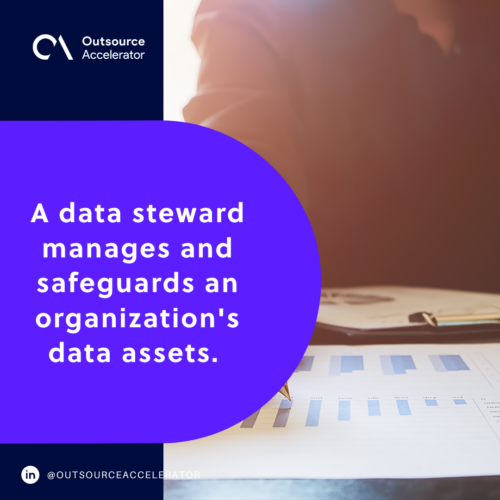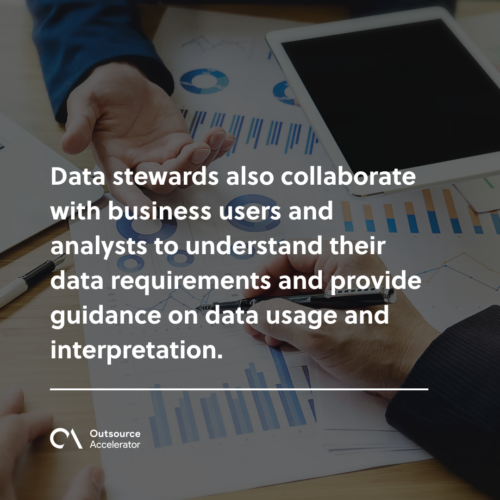What is a data steward?

Growing organizations will realize that the amount of data they maintain does as well. This also calls for the need for individuals to oversee and ensure the quality, integrity, and security of the information they manage.
Within these organizations comes the role of a data steward. They are tasked with managing volumes of data in line with the company’s governance policies.
This article explores the role of a data stewards, its key responsibilities, and the essential skills required for this role.
What is a data steward?
A data steward manages and safeguards an organization’s data assets. They act as custodians and are accountable for ensuring that data is consistent and reliable.
Data stewards are vital in establishing and enforcing an organization’s data governance policies.
They record data breaches, leaks, and other security issues that employees encounter. Moreover, they help solve data-related problems by mapping them between different systems.

Key responsibilities of a data steward
A data steward ensures the quality of data the company processes is at par with their requirements and standards.
Specifically, here are the key responsibilities of a data steward:
Data quality management
One of the primary responsibilities of a data steward is to ensure the quality of data. They are in charge of:
- Developing and implementing data standardization techniques
- Performing data profiling and cleansing activities
- Collaborating with data owners and users to resolve data quality issues
Organizations can make informed decisions and gain valuable insights by maintaining high-quality data.
Engaging in data stewardship involves active participation in the oversight of data assets, working to improve data governance policies, practices, and procedures.
Data security and privacy
Data stewards are entrusted with protecting sensitive and confidential information.
They develop and enforce data security and privacy policies aligned with relevant regulations. This includes the GDPR for data privacy in Europe and the HIPAA for dealing with patient records.
Additionally, data stewards work closely with IT teams to implement security measures and lessen the risk of data breaches.
Data governance
Data governance involves managing and controlling data assets within an organization. Data stewards play a pivotal role in establishing data governance frameworks, defining data standards, and enforcing data management best practices.
They collaborate with various stakeholders to ensure data is properly classified, stored, and utilized according to organizational policies.
Collaborating with multiple data stewards across different departments, they maintain a unified approach to data governance and ensure consistent data quality.
Data stewardship focuses on promoting data quality, security, and compliance within an organization, fostering a culture of data governance.
Data documentation and metadata management
Data stewards are responsible for creating and managing documentation to make it searchable. They develop metadata standards, update information, and ensure documentation is current.
This helps users understand the meaning and context of data, enabling effective data analysis and decision-making.
Managing data involves overseeing data lifecycle processes, such as acquisition, storage, and sharing, to optimize data usability and value for informed decision-making.
Data integration and collaboration
Data stewards facilitate data integration efforts across different systems and departments. They work closely with data architects and developers to design and implement data integration strategies, ensuring consistency and coherence.
Data stewards also collaborate with business users and analysts to understand their data requirements and provide guidance on data usage and interpretation.

Skills required for a data steward role
A data steward requires unique skills and competencies to manage an organization’s data assets.
Here are some of the essential skills they should possess:
Knowledge of data management
Data stewards must deeply understand data governance principles, quality, modeling, and metadata management. They should be familiar with industry best practices and emerging trends in data management.
Problem-solving skills
Data stewards need strong analytical and problem-solving skills, given the complexity of data-related challenges. They should be able to analyze data issues, identify root causes, and propose effective solutions.
Attention to detail and critical thinking are crucial to data accuracy and reliability.
Data stewards oversee the integrity, security, and quality of organizational data, necessitating a meticulous approach and attention to detail to ensure data accuracy and consistency.
Communication and collaboration skills
In addition to technical expertise, data stewards must possess excellent business communication and collaboration skills.
They act as bridges between technical and non-technical stakeholders. Data stewards should be adept at translating technical jargon into understandable terms for business users and executives.
Strong interpersonal skills and the ability to influence others are also valuable assets in this role. This is since their interpretation of datasets can impact the stakeholders’ decision-making.
Programming skills
While not every data steward is expected to be an expert programmer, a basic understanding of programming languages and tools is a plus. With programming knowledge, they can easily automate management processes and perform data analysis.
Usually, data stewards are familiar with structured query language (SQL), Python, or R. They also write scripts to handle large datasets and perform complex operations.
Strategic mindset
Lastly, data stewards should possess a strategic mindset to align data management efforts with the organization’s goals and objectives. They must understand the business context and identify opportunities for value and innovation.
A data steward with a strategic mindset can identify trends and patterns within the data they manage. They can anticipate future needs and proactively develop management strategies to support evolving business requirements.
Hiring a data steward
Different aspects should be considered when hiring a data steward since they will deal with big data.
Apart from the skills above, organizations should look for candidates with a solid background in data management. Most companies prefer applicants possessing certifications such as CDMP.
A data steward responsibilities plays a crucial role in ensuring data lineage, which involves tracing the origin of data and understanding how it moves through various systems.
Data stewards can be hired in different ways. While enterprises usually opt to hire in-house data stewards for better monitoring, startups can hire freelancers or outsource data management instead.
Data stewards are critical in ensuring organizations’ effective management and governance of data assets. They contribute to data-driven decision-making, improved operational efficiency, and enhanced organizational performance.







 Independent
Independent




